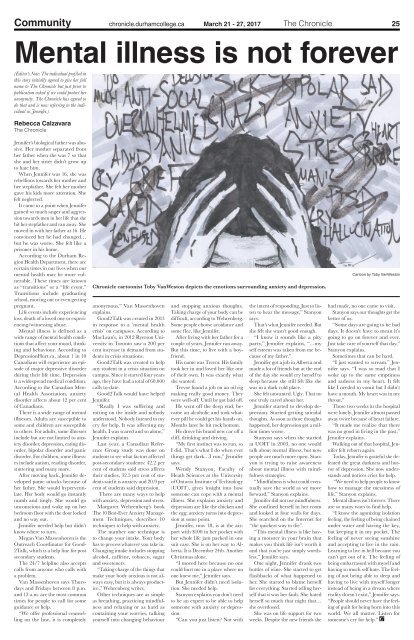You also want an ePaper? Increase the reach of your titles
YUMPU automatically turns print PDFs into web optimized ePapers that Google loves.
Community chronicle.durhamcollege.ca March 21 - 27, 2017 The Chronicle 25<br />
Mental illness is not forever<br />
(Editor’s Note: The individual profiled in<br />
this story initially agreed to give her full<br />
name to The Chronicle but just prior to<br />
publication asked if we could protect her<br />
anonymity. The Chronicle has agreed to<br />
do that and is now referring to the individual<br />
as Jennifer.)<br />
Rebecca Calzavara<br />
The Chronicle<br />
Jennifer’s biological father was abusive.<br />
Her mother separated from<br />
her father when she was 7 so that<br />
she and her sister didn’t grow up<br />
to hate him.<br />
When Jennifer was <strong>16</strong>, she was<br />
rebellious towards her mother and<br />
her stepfather. She felt her mother<br />
gave his kids more attention. She<br />
felt neglected.<br />
It came to a point when Jennifer<br />
gained so much anger and aggression<br />
towards men in her life that she<br />
hit her stepfather and ran away. She<br />
moved in with her father at <strong>16</strong>. He<br />
convinced her he had changed…<br />
but he was worse. She felt like a<br />
prisoner in his home.<br />
According to the Durham Region<br />
Health Department, there are<br />
certain times in our lives when our<br />
mental health may be more vulnerable.<br />
These times are known<br />
as “transitions” or a “life event.”<br />
Transitions include graduating<br />
school, moving out or even getting<br />
pregnant.<br />
Life events include experiencing<br />
loss, death of a loved one or experiencing/witnessing<br />
abuse.<br />
Mental illness is defined as a<br />
wide range of mental health conditions<br />
that affect your mood, thinking<br />
and behaviour. According to<br />
DepressionHurt.ca, about 1 in 10<br />
Canadians will experience an episode<br />
of major depressive disorder<br />
during their life time. Depression<br />
is a widespread medical condition.<br />
According to the Canadian Mental<br />
Health Association, anxiety<br />
disorder affects about 12 per cent<br />
of Canadians.<br />
There is a wide range of mental<br />
illnesses. Adults are susceptible to<br />
some and children are susceptible<br />
to others. For adults, some illnesses<br />
include but are not limited to anxiety<br />
disorder, depression, eating disorder,<br />
bipolar disorder and panic<br />
disorder. For children, some illnesses<br />
include autism, reading disorder,<br />
stuttering and many more.<br />
After moving back, Jennifer developed<br />
panic attacks because of<br />
her father. She would hyperventilate.<br />
Her body would go instantly<br />
numb and tingly. She would go<br />
unconscious and wake up on her<br />
bedroom floor with the door locked<br />
and no way out.<br />
Jennifer needed help but didn’t<br />
know where to turn.<br />
Megan Van Massenhoven is the<br />
Outreach Coordinator for Good-<br />
2Talk, which is a help line for post<br />
secondary students.<br />
The 24/7 helpline also accepts<br />
calls from anyone who calls with<br />
a problem.<br />
Van Massenhoven says Thursdays<br />
and Fridays between 8 p.m.<br />
and 12 a.m. are the most common<br />
times for people to call for some<br />
guidance or help.<br />
“We offer professional counselling<br />
on the line, it is completely<br />
Chronicle cartoonist Toby VanWeston depicts the emotions surrounding anxiety and depression.<br />
anonymous,” Van Massenhoven<br />
explains.<br />
Good2Talk was created in 2013<br />
in response to a ‘mental health<br />
crisis’ on campuses. According to<br />
MacLean’s, in 2012 Ryerson University<br />
in Toronto saw a 200 per<br />
cent increase in demand from students<br />
in crisis situations.<br />
Good2Talk was created to help<br />
any student in a crisis situation on<br />
campus. Since it started four years<br />
ago, they have had a total of 60,000<br />
calls to-date.<br />
Good2Talk would have helped<br />
Jennifer.<br />
“Really I was suffering and<br />
rotting on the inside and nobody<br />
understood. Nobody listened to my<br />
cry for help. It was affecting my<br />
health. I was scared and so alone,”<br />
Jennifer explains.<br />
Last year, a Canadian Reference<br />
Group study was done on<br />
students to see what factors affected<br />
post-secondary students: 42.2 per<br />
cent of students said stress affects<br />
their studies, 32.5 per cent of students<br />
said it is anxiety and 20.9 per<br />
cent of students said depression.<br />
There are many ways to help<br />
with anxiety, depression and stress.<br />
Margaret Wehrenberg’s book<br />
The 10 Best-Ever Anxiety Management<br />
Techniques, describes 10<br />
techniques to help with anxiety.<br />
The number one technique is<br />
to change your intake. Your body<br />
has to process whatever you take in.<br />
Changing intake includes stopping<br />
alcohol, caffeine, tobacco, sugar<br />
and sweeteners.<br />
“Taking charge of the things that<br />
make your body anxious is not always<br />
easy, but it is always productive,”<br />
Wehrenberg writes.<br />
Other techniques are as simple<br />
as breathing, practicing mindfulness<br />
and relaxing or as hard as<br />
containing your worries, talking<br />
yourself into changing behaviour<br />
and stopping anxious thoughts.<br />
Taking charge of your body can be<br />
difficult, according to Wehrenberg.<br />
Some people choose avoidance and<br />
some flee, like Jennifer.<br />
After living with her father for a<br />
couple of years, Jennifer ran away.<br />
But this time, to live with a boyfriend.<br />
His name was Trevor. His family<br />
took her in and loved her like one<br />
of their own. It was exactly what<br />
she wanted.<br />
Trevor found a job on an oil rig<br />
making really good money. They<br />
were well-off. Until he got laid off.<br />
He went off the deep end, became<br />
an alcoholic and took whatever<br />
pill he could get his hands on.<br />
Months later he hit rock bottom.<br />
He drove his brand new car off a<br />
cliff, drinking and driving.<br />
“My first instinct was to run, so<br />
I did. That’s what I do when ever<br />
things get dark…I run,” Jennifer<br />
says.<br />
Wendy Stanyon, Faculty of<br />
Heath Sciences at the University<br />
of Ontario Institute of Technology<br />
(UOIT), gives insight into how<br />
someone can cope with a mental<br />
illness. She explains anxiety and<br />
depression are like the chicken and<br />
the egg; anxiety turns into depression<br />
at some point.<br />
Jennifer, now 18, is at the airport<br />
with $100 in her pocket with<br />
her whole life jam packed in one<br />
suit case. She is on her way to Alberta.<br />
It is December 24th. Another<br />
Christmas alone.<br />
“I moved here because no one<br />
could hurt me in a place where no<br />
one knew me,” Jennifer says.<br />
But Jennifer didn’t need isolation.<br />
She needed help.<br />
Stanyon explains you don’t need<br />
to be an expert to be able to help<br />
someone with anxiety or depression.<br />
“Can you just listen? Not with<br />
the intent of responding. Just to listen<br />
to hear the message,” Stanyon<br />
says.<br />
That’s what Jennifer needed. But<br />
she felt she wasn’t good enough.<br />
“I know it sounds like a pity<br />
party,” Jennifer explains, “…my<br />
self esteem was taken from me because<br />
of my father.”<br />
Jennifer got a job in Alberta and<br />
made a lot of friends but at the end<br />
of the day she would cry herself to<br />
sleep because she still felt like she<br />
was in a dark cold place.<br />
She felt unwanted. Ugly. That no<br />
one truly cared about her.<br />
Jennifer started to develop depression.<br />
Started getting suicidal<br />
thoughts. As soon as those thoughts<br />
happened, her depression got a million<br />
times worse.<br />
Stanyon says when she started<br />
at UOIT in 2003, no one would<br />
talk about mental illness, but now<br />
people are much more open. Stanyon<br />
is trying to raise awareness<br />
about mental illness with mindfulness<br />
strategies.<br />
“Mindfulness is what could eventually<br />
save the world as we move<br />
forward,” Stanyon explains.<br />
Jennifer did not use mindfulness.<br />
She confined herself in her room<br />
and looked at four walls for days.<br />
She searched on the Internet for<br />
“the quickest way to die”.<br />
“This mental illness is like having<br />
a monster in your brain that<br />
makes you think life isn’t worth it<br />
and that you’re just simply worthless,”<br />
Jennifer says.<br />
One night, Jennifer drank two<br />
bottles of wine. She started to get<br />
flashbacks of what happened to<br />
her. She started to blame herself<br />
for everything. Started telling herself<br />
that it was her fault. She hated<br />
herself so much that night that…<br />
she overdosed.<br />
She was on life support for two<br />
weeks. Despite the new friends she<br />
Cartoon by Toby VanWeston<br />
had made, no one came to visit.<br />
Stanyon says our thoughts get the<br />
better of us.<br />
“Some days are going to be bad<br />
days. It doesn’t have to mean it’s<br />
going to go on forever and ever.<br />
Just take care of yourself that day,”<br />
Stanyon explains.<br />
Sometimes that can be hard.<br />
“I just wanted to scream.” Jennifer<br />
says. “I was so mad that I<br />
woke up to the same emptiness<br />
and sadness in my heart. It felt<br />
like I needed to vomit but I didn’t<br />
have a mouth. My heart was in my<br />
throat.”<br />
Those two weeks in the hospital<br />
were lonely. Jennifer almost passed<br />
away twice because of heart failure.<br />
“It made me realize that there<br />
was no good in living in the past,”<br />
Jennifer explains.<br />
Walking out of that hospital, Jennifer<br />
felt reborn again.<br />
Today, Jennifer is grateful she defeated<br />
the great darkness and horror<br />
of depression. She now understands<br />
and notices cries for help.<br />
“We need to help people to know<br />
how to manage the messiness of<br />
life,” Stanyon explains.<br />
Mental illness isn’t forever. There<br />
are so many ways to find help.<br />
“I know the agonizing isolation<br />
feeling, the feeling of being chained<br />
under water and having the key,<br />
but keeping it in my pocket. The<br />
feeling of never seeing sunshine<br />
and accepting to live in the rain.<br />
Learning to live in hell because you<br />
can’t get out of it. The feeling of<br />
being embarrassed with myself and<br />
having so much self hate. The feeling<br />
of not being able to sleep and<br />
having to live with myself longer<br />
instead of being in a dream where<br />
reality doesn’t exist,” Jennifer says.<br />
“People should never have the feeling<br />
of guilt for being born into this<br />
world. We all matter. Listen for<br />
someone’s cry for help.”


















